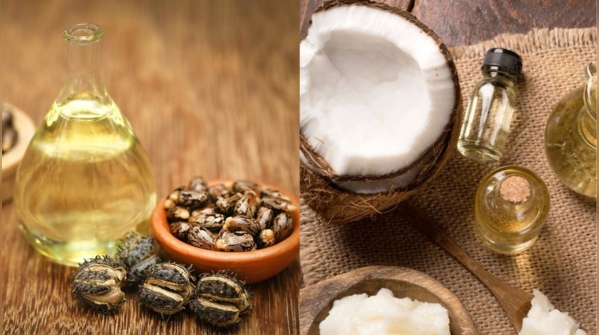Castor oil vs coconut oil: Which is better for your hair?

For lustrous and strong locks
For lustrous and strong locks In the segment of beauty, we often face the dilemma of choosing the best natural product for our skin and hair. Today, we’ll compare castor oil and coconut oil to help you decide which is better for your hair. Each oil has its unique benefits, and many people use both depending on their needs. This guide will help you choose the best option for achieving strong, lustrous hair while addressing issues like grey hair, dandruff, and hair fall.

Introduction to castor and coconut oil
Castor oil is derived from the castor bean plant and has a thick, sticky texture. It has been a staple in the beauty industry for years due to its richness in fatty acids and ricinoleic acid, which can improve hair texture. On the other hand, coconut oil, commonly used in India, is extracted from the coconut kernel and is also used in cooking and personal care. Its medium-chain fatty acids allow it to be easily absorbed, contributing to its widespread popularity. Let’s compare their advantages.
(Image Credits: Pinterest)

In terms of hair growth
Castor oil is renowned for promoting hair growth. Its primary fatty acid, ricinoleic acid, stimulates hair follicles, leading to thicker and fuller hair. While coconut oil does not directly promote hair growth, it helps prevent hair breakage by coating the hair shaft and reducing split ends. To see noticeable results in hair growth, castor oil should be used twice a week.
(Image Credits: Pinterest)

Dry and frizzy hair issues
Both oils address dryness and frizz in different ways. Castor oil is a humectant, meaning it draws moisture into the hair and scalp. Coconut oil, on the other hand, forms a barrier that locks in moisture for a prolonged period. If your hair is very dry, castor oil might be the better choice for an initial conditioning treatment. To maintain moisture, you can then use coconut oil.
(Image Credits: Pinterest)

Overall hair health
Dandruff often leads to an itchy and dry scalp. In such cases, castor oil can help reduce inflammation, while coconut oil can combat dandruff due to its antifungal properties. Castor oil improves blood flow to the scalp and acts as a humectant, drawing moisture to the hair shaft to prevent dryness and damage. Coconut oil also prevents dryness, and its lauric acid content binds to hair proteins, making them stronger and healthier.
(Image Credits: Pinterest)

Which one to choose?
There is no definitive “best” oil for hair growth, as both oils offer unique benefits. Castor oil excels in promoting hair growth and improving scalp health, while coconut oil adds shine, tames frizz, and nourishes the hair. Castor oil is thick and often requires a carrier oil.
(Image Credits: Pinterest)

For best results use this oil
For optimal results, consider using coconut oil as a carrier oil and mix both oils to use twice a week. This combination can help you achieve the best results for your hair.

Which one do you prefer?
Which one is yur favourite oil out of the two?

Also, heat the oil for better results
For better absorption of hair oil, try and heat it a little before apply it to your hair.

What happens when you don't oil your hair?
Because when you do not oil your hair, these turn dry, brittle, and break easily. Probably the natural oils in your scalp alone are not good enough to condition and protect the hair from the ever-occurring aggression of ambiance or the heated styling tooling. Not oiling your hair may cause disruption to the scalp barrier, leading to problems like dandruff or irritation. Over time, this dryness causes your hair to lose its natural sheen and makes your hair unmanageable. This invites problems with styling and also causes split ends in some cases. Regular oiling helps hydrate the scalp, nourishes the scalp, and maintains overall hair health.

Why oiling is a must?
Oiling of hair is not only a pampering thing; it is quite essential in nature for maintaining healthy and shiny locks. Regular oiling keeps the scalp nourished, reinforces hair roots, and brings overall health to the hair by infusing nutrients and moisture into the hair. It helps reduce dryness by avoiding split ends and aids in hair growth due to improved blood circulation at the scalp. Whether your preference be coconut, argan, or olive oil, this addition to hair care can most definitely lead to shinier, softer hair and a healthier scalp.









